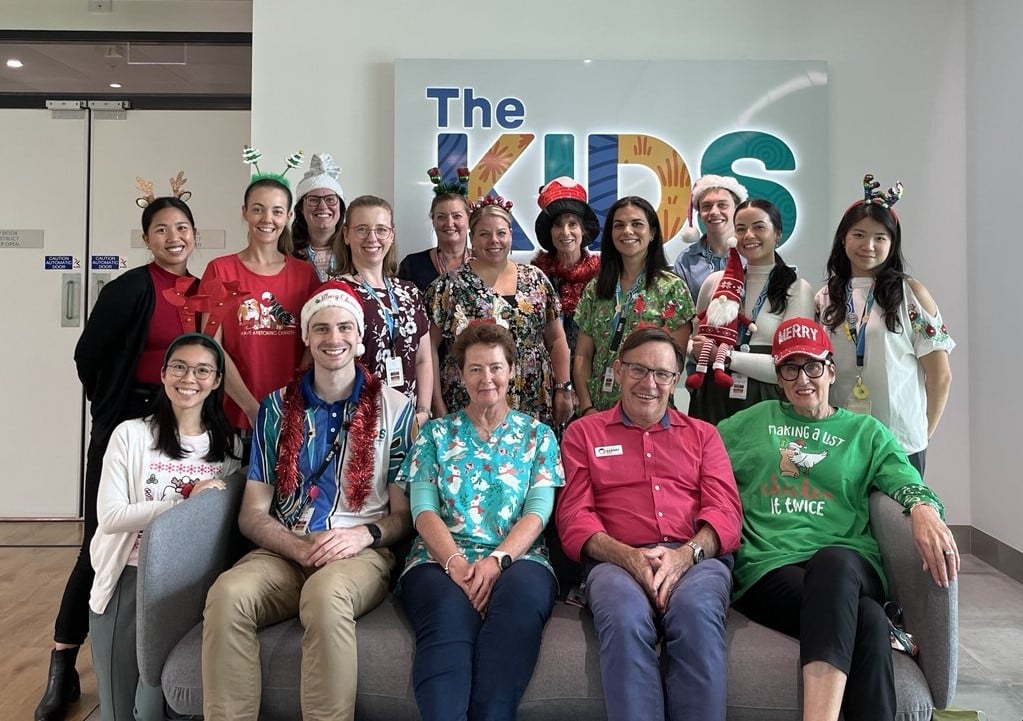2024 Vaccine Trials Group Christmas Update

The year that was ..... 2024!
As we look back on the past 12 months, I am pleased to reflect on the impact of the work we do at the Vaccine Trials Group in partnership with the all the families and volunteers who take part in our studies.
This year, WA was the first state in Australia to implement the RSV immunisation, nirsevimab (also known as Beyfortus™). Our group was involved in clinical trials in preterm babies and term infants over the last 10 years which have led to an effective preventive product for RSV. RSV is the most common cause of hospitalisation in infants aged under six months, so it has been great to see that 85 per cent of newborn babies who were eligible have had the immunisation, as well as two thirds of older infants (approximately 24,000 immunisations!). This has proved very effective in WA babies, reducing the risk of hospital admission by more than 80 per cent and avoiding more than 350 hospital admissions for WA families. An additional long-acting immunisation has been evaluated in infants and high-risk children (the RSV Protect study) and it looks as though this will be safe and provide high levels of protection against hospitalisation with RSV.
In 2025, we will also see maternal RSV immunisation Abrysvo™ become part of the National Immunisation Program. VTG was involved in the Phase 3 trial, which saw many mother-infant pairs benefit from this vaccine. Unfortunately, RSV vaccines for older toddlers and preschool children – in whom RSV can still cause pneumonia and wheezing illnesses – are still lagging, with early stage trials progressing.
The resurgence of an epidemic of whooping cough (pertussis) in Australia in the last 18 months reminds us how infectious this illness - more than 53,000 cases notified in 2024 alone, with the majority (> 60%) in school children aged 5-14 years. While immunisation with our current whooping cough vaccine and probably natural exposure protect us against severe disease, vaccines that provide longer-lasting protection and stop transmission are still needed. Results of the Whooping Cough in Young Adults Study investigating the pertussis-only booster vaccine in adults look promising, with higher levels of antibody 12 months after vaccination. We hope this will be available in Australia in the near future and will be particularly useful for use in pregnant mothers to optimise protection of babies. Another new approach was shown in the SUPER Study, using a live weakened strain of the pertussis bacteria as a nasal spray in children.This again looks very promising, with strong immune responses in the nose and throat, and has now entered large Phase 3 studies in older children and adults. The VTG laboratory team has also been working to understand the best way to use our current whooping cough vaccines. Dr Sonia McAlister was awarded her PhD this year on optimising whooping cough vaccine schedules for babies and mothers, and has now been awarded a Brightspark Fellowship to continue these studies. As part of her fellowship, Sonia will visit a leading laboratory in Europe to develop techniques to better evaluate children’s and adults’ responses to whooping cough vaccines using samples collected from our Prime Study.
We also continue to have success with our ongoing studies of the 5-in-1 meningococcal ABCWY vaccine in teenagers and young adults, which have been accepted for publication in high impact international journals. We are hoping the positive results from the Quintet and Boost studies showing the safety and excellent responses to all five meningococcal strains will lead to the vaccine being licensed over the next couple of years.
The PICOBOO Study evaluating COVID booster vaccines in younger and older adults and adolescents has seen the first publication of results. These have shown a good response to all three vaccines, with better initial responses to mRNA vaccines but slower waning of antibodies after the Novavax protein vaccine. We are now investigating why this is occurring, using a biobank of samples collected during the study.
We have also completed recruitment for a number of important studies: i) the ATOMIC Ears Study in children with chronic and recurrent ear infections; ii) the OPTIMUM study looking at prevention of food allergies in infants; iii) the recent Novavax combined COVID-19 and influenza vaccine in older adults; as well as iv) the CMVictory Study for the prevention of cytomegalovirus infections that has recently met the trigger point for the analysis of results.
We have just commenced a new pneumococcal study and were the first site in the world to recruit participants for this important research. Pneumococcus is the most common cause of bacterial meningitis in children and is a very serious illness – up to 1/4 of children who develop the infection are left with a neurological disability such as deafness or cerebral palsy. All babies currently receive a pneumococcal vaccine covering 13 strains of the bacteria as per the National Immunisation Program, where as the new study vaccine covers an additional eight strains, taking the total number to 21 strains.
Thank you to all the participants in these and other studies who make the vital work we do possible and ultimately help people living in Australia and throughout the world. I hope you enjoy reading more about our studies in this newsletter. I wish you and your families a festive Christmas and New Year break, and we look forward to a busy 2025 at the Vaccine Trials Group.
Professor Peter Richmond
Head of the Vaccine Trials Group
